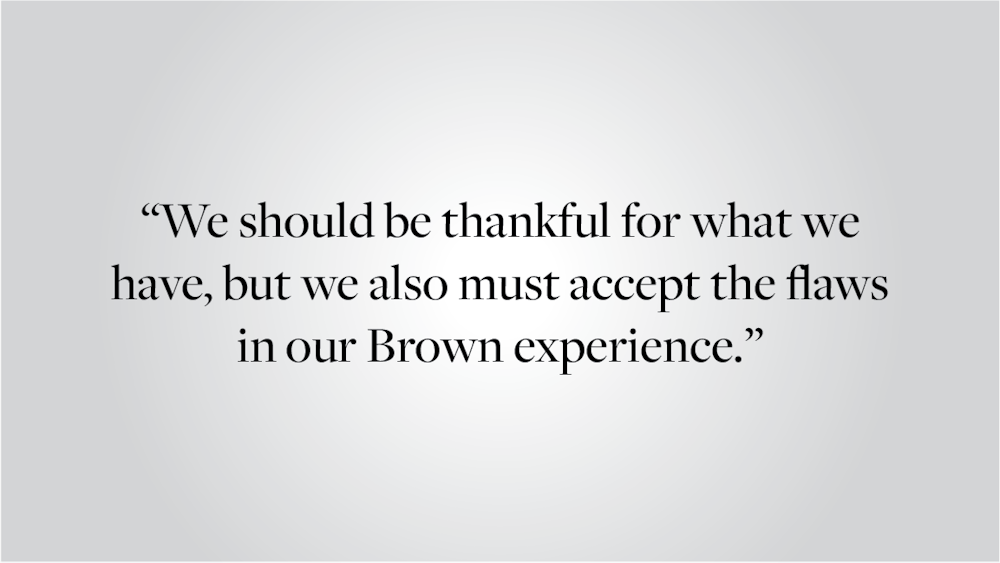“I’m just thankful to end my Brown career with a semi-normal semester.”
Every time I’ve been asked how my senior year has been going, that has been the answer. And it is certainly true. After missing a year at Brown due to coming in as a sophomore transfer student and then spending junior year in my isolated dorm room surviving off of Ratty takeout meals, it feels nice to have some semblance of normalcy. Although wearing KN-95s for hours on end is not the most comfortable, in-person reunions in office hours, dining halls and on the Main Green make up for this discomfort.
I am immensely grateful that I am able to end my collegiate education with in-person classes and club meetings and Blue Room muffins galore. Yet, although senior year is traditionally a time of relentless joy leading up to receiving one’s degree, it is hard to feel that right now. I constantly vacillate between excitement about entering the real world and regret for what has been lost in my higher education experience. The classes of 2023 and 2022 have missed out; our time at Brown feels incomplete.
As the time between being sent home and returning for fall 2021 flashed by, first-years became juniors and sophomores became seniors. Regardless of what our ASK profiles may say, the semester levels for many of these students feel wrong for a wide variety of reasons. Canceled and remote internships, no studying abroad, limited course offerings, the loss of memorable University events — the Brown experience we expected was ripped away. And although we spent the 2020-21 year trying to cope, it’s difficult not to feel sadness and even anger when thinking about what could have been.
And Brown students were not alone in facing adversity over the past two years. The American College Health Association found that 48% of college students reported moderate or severe psychological stress in 2021. 53% reported being lonely. Other research found that students felt disconnected from their academic work and those around them. Furthermore, some students feel more behind than others given the external pressures that familial and financial obligations, as well as disabilities, may have placed on their remote learning experiences. Most critically, the emotional well-being of some students was affected by the loss of friends, family and loved ones due to COVID-19.
COVID-19 became a major source of anxiety for those seeking professional experience as well. The pandemic led to widespread internship cancellations during summer 2020, with Glassdoor estimating that half of internship opportunities in the U.S. were canceled. Consequently, the limited opportunities remaining became extremely competitive. And for those who managed to secure an internship, the confines of Zoom made reaping the benefits even more difficult. When I was offered a spot in the 2021 Brown in Washington Summer program, it was a major relief — despite working as a Peer Career Advisor for CareerLAB, I was rejected from most of the opportunities I had applied for. However, recreating the exciting experience of living and working in Washington, D.C. when you're running errands with your parents in a small town in Connecticut is nearly impossible. Like so many other students, the moments meant to facilitate my growth during college felt hollow.
The pandemic has left its mark on student habits as well. The disconnect from traditional academic and social life has left student bodies across the country unmotivated. Within Brown’s community, I imagine you’d be hard-pressed to find a current junior or senior who feels like their studying habits have been unchanged during COVID-19. Rebuilding the same academic diligence is difficult after a whole year and half of watching recordings or streaming Zoom classes while lying in bed.
Watching the class of 2025 arrive in Providence this fall with the first chance at a normal college year since March 2020, it was easy for Brown’s upperclassmen to look back on their experiences with a sense of longing for what could have been. Messaging that has been filled with hope glosses over what precious memories and opportunities for growth we’ve lost. It’s unquestionable — we would be entirely different Brown students if COVID-19 had never existed. It’s also difficult to express our frustration given that the struggles of Ivy League college students seem insignificant in the broader context of the pandemic.
There’s no way to recuperate our lost time. We should be thankful for what we have, but we also must accept the flaws in our Brown experience. Deluding ourselves that every moment of last year was still meaningful in some way overlooks our collective loss. Talking about and accepting the imperfections of our time on College Hill is the only way we can leave campus with closure.
Deepak Gupta ’22 can be reached at deepak_gupta@brown.edu. Please send responses to this opinion to letters@browndailyherald.com and op-eds to opinions@browndailyherald.com.





